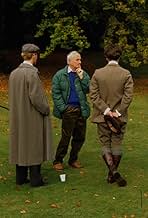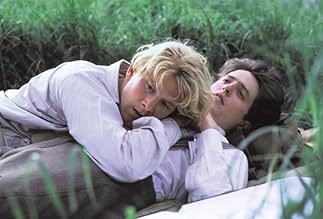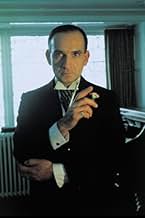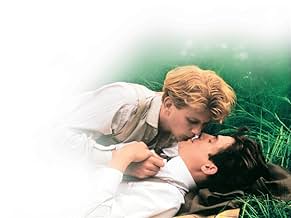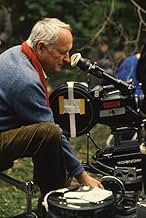PUNTUACIÓN EN IMDb
7,6/10
26 mil
TU PUNTUACIÓN
Después de que su amante lo rechaza, un joven atrapado por la opresión de la sociedad eduardiana intenta llegar a un acuerdo y aceptar su sexualidad.Después de que su amante lo rechaza, un joven atrapado por la opresión de la sociedad eduardiana intenta llegar a un acuerdo y aceptar su sexualidad.Después de que su amante lo rechaza, un joven atrapado por la opresión de la sociedad eduardiana intenta llegar a un acuerdo y aceptar su sexualidad.
- Dirección
- Guión
- Reparto principal
- Nominado para 1 premio Óscar
- 3 premios y 2 nominaciones en total
Reseñas destacadas
When E M Forster wrote "Maurice" homosexuality was considered a mental illness, a criminal offence, an aberration, a sin against God, (it still is in some quarters). It wasn't so long since Oscar Wilde was jailed for sodomy and Forster, had his own homosexuality become public knowledge, would certainly have found himself in a similar predicament and would never have enjoyed the literary eminence that he did. So consequently, moved though he was to write the book, gave instructions that it should not be published until after his death, and Forster lived for a very long time. When "Maurice" eventually did see the light of day, it seemed terribly dated. 'I'm an unspeakable of the Oscar Wilde sort', Maurice tells his doctor in a feeble attempt to be 'cured' of his 'affliction', and a line which the movie retains. Gay literature had come a long way in the interim and homosexuality was no longer seen as an illness nor a crime.
But Forster's view of homosexuality was, surprisingly, not a tortured, shame-filled one but touchingly, if ridiculously, romantic. When Maurice finally does find true love, it cuts across all barriers including class and has the lovers retreating, like some gay Adam and Eve, to 'the greenwood'. It seems unrealistic but at the same time liberating long before the term 'gay liberation' was ever coined.
James Ivory's screen version is remarkably faithful to the original and consequently risks ridicule in this so-called more enlightened age. But Ivory's intelligence as a film-maker has long been over-looked in favour of an emphasis on his prettified recreations of the past. Yet he remains the pre-eminent chronicler in British cinema, (though American and consistently working with an Indian producer, Ismail Merchant), of a particular period in British history mostly through adaptations of novels by writers of the period or by contemporary authors writing about the period. But when Ivory did adapt 'classic' literature, he concentrated on the best and working mostly with the great writer Ruth Prawer Jhabvala, brought to bear on these adaptations a deeply felt and genuine appreciation of their worth.
Hence "Maurice" is as fastidiously good as we have come to expect, the difference being that this time the script is not by Jhabvala but by Ivory himself and Kit Hesketh-Harvey. In every other respect it looks and feels typically 'Merchant-Ivory', a term some people believe stultified British cinema at a time when other directors were making edgy, contemporary 'new-wave' films. But that is like condemning well-acted, well-crafted Shakespeare just because it's old.
"Maurice" is a superbly acted, visually gorgeous film, though at times its fidelity to its source means that sometimes certain scenes feel stilted, (you make want to give these people a good shaking). And did they need to cast actors as beautiful as James Wilby (Maurice), Hugh Grant, (his first great love, Clive Durham), and Rupert Graves, (the game-keeper Scudder, shades of a gay Lady Chatterly, the boy he finally falls for)? All three play wonderfully well and Ivory populates his film with a cast of wonderful character actors, (Simon Callow, Denholm Elliot, Billie Whitelaw, Judy Parfitt), all playing at the top of their form.
Of course, both book and film have now largely been set aside as dated and irrelevant in the annals of gay literature and cinema. Surely not. The film remains as much an integral part of the history and consequential progress of main-stream gay movie-making as "Brokeback Mountain", (though by no means as commercially successful), as it is an integral part of the Merchant-Ivory stable. Anyone remotely interested in either should seek it out.
But Forster's view of homosexuality was, surprisingly, not a tortured, shame-filled one but touchingly, if ridiculously, romantic. When Maurice finally does find true love, it cuts across all barriers including class and has the lovers retreating, like some gay Adam and Eve, to 'the greenwood'. It seems unrealistic but at the same time liberating long before the term 'gay liberation' was ever coined.
James Ivory's screen version is remarkably faithful to the original and consequently risks ridicule in this so-called more enlightened age. But Ivory's intelligence as a film-maker has long been over-looked in favour of an emphasis on his prettified recreations of the past. Yet he remains the pre-eminent chronicler in British cinema, (though American and consistently working with an Indian producer, Ismail Merchant), of a particular period in British history mostly through adaptations of novels by writers of the period or by contemporary authors writing about the period. But when Ivory did adapt 'classic' literature, he concentrated on the best and working mostly with the great writer Ruth Prawer Jhabvala, brought to bear on these adaptations a deeply felt and genuine appreciation of their worth.
Hence "Maurice" is as fastidiously good as we have come to expect, the difference being that this time the script is not by Jhabvala but by Ivory himself and Kit Hesketh-Harvey. In every other respect it looks and feels typically 'Merchant-Ivory', a term some people believe stultified British cinema at a time when other directors were making edgy, contemporary 'new-wave' films. But that is like condemning well-acted, well-crafted Shakespeare just because it's old.
"Maurice" is a superbly acted, visually gorgeous film, though at times its fidelity to its source means that sometimes certain scenes feel stilted, (you make want to give these people a good shaking). And did they need to cast actors as beautiful as James Wilby (Maurice), Hugh Grant, (his first great love, Clive Durham), and Rupert Graves, (the game-keeper Scudder, shades of a gay Lady Chatterly, the boy he finally falls for)? All three play wonderfully well and Ivory populates his film with a cast of wonderful character actors, (Simon Callow, Denholm Elliot, Billie Whitelaw, Judy Parfitt), all playing at the top of their form.
Of course, both book and film have now largely been set aside as dated and irrelevant in the annals of gay literature and cinema. Surely not. The film remains as much an integral part of the history and consequential progress of main-stream gay movie-making as "Brokeback Mountain", (though by no means as commercially successful), as it is an integral part of the Merchant-Ivory stable. Anyone remotely interested in either should seek it out.
I remember I saw this movie I was about 17. I'd read the book and fell in love. It tells a love story between two men and the way they have to carry it out despite society rules (with some changes it still happens nowadays...).
The general message would be "love conquers all" but is it really so? Are Maurice and Scudder able to live happily ever after? I doubt, and on the beginning of the XXth century it would be even worse.
Despite all, it's lovely to watch the same kind of story we're used to watching in movies that portray society in different times, but now speaking about love between men! Although James Ivory's work is beyond criticism, in my point a view, there were some scenes in the book (the one when they are in London, sitting naked by the fire, for instance) that really should be in the movie.
But it's a tender and romantic approach of of book (only published after E.M. Foster's death) that surely would have pleased it's author.
The general message would be "love conquers all" but is it really so? Are Maurice and Scudder able to live happily ever after? I doubt, and on the beginning of the XXth century it would be even worse.
Despite all, it's lovely to watch the same kind of story we're used to watching in movies that portray society in different times, but now speaking about love between men! Although James Ivory's work is beyond criticism, in my point a view, there were some scenes in the book (the one when they are in London, sitting naked by the fire, for instance) that really should be in the movie.
But it's a tender and romantic approach of of book (only published after E.M. Foster's death) that surely would have pleased it's author.
This is the most emotional love story I have ever viewed. I first saw the film when I was about 14, and I had no problem sitting through the entire two and a half hours of rich period drama. Merchant and Ivory are two of the best filmmakers ever, and they treat this delicate subject with grace and tact. It makes being a gay teenager a little more bearable, because it is one of the few movies in which the gay lead finds love, and survives. An altogether edifying experience.
Maurice' had a deep emotional impact on me when I first saw it in my early teens, more than ten years ago. I just saw it again for the first time since then and I was a bit worried that I would be disappointed, but then I was definitely not. It still had the same magic.
To me, this is the #1 Merchant-Ivory work. I find this movie astoundingly profound compared to several other of their movies. This movie is above all accomplished by the excellent acting. It tells a pure and convincing story about struggling to be true to oneself in a world of not only prejudice and firm standards but even serious legal sanctions.
I think Maurice' is far more romantic, and sexy, than most heterosexual love stories I have seen. The love and longing of these men seems so real and pure, especially by the fact that they are consistently being told that their inclination is `unspeakable', and their futures and careers are at stake.
It is great to see Hugh Grant in an early role (his first real movie role?) that is so different from the mainstream comedy entertainer he has become. The ending is stunning. I love that the movie ended exactly where it did, although it is a dread to acknowledge that the war would break out soon after. The music score is enthralling. And Alec Scudder is so beautiful that it hurts.
To me, this is the #1 Merchant-Ivory work. I find this movie astoundingly profound compared to several other of their movies. This movie is above all accomplished by the excellent acting. It tells a pure and convincing story about struggling to be true to oneself in a world of not only prejudice and firm standards but even serious legal sanctions.
I think Maurice' is far more romantic, and sexy, than most heterosexual love stories I have seen. The love and longing of these men seems so real and pure, especially by the fact that they are consistently being told that their inclination is `unspeakable', and their futures and careers are at stake.
It is great to see Hugh Grant in an early role (his first real movie role?) that is so different from the mainstream comedy entertainer he has become. The ending is stunning. I love that the movie ended exactly where it did, although it is a dread to acknowledge that the war would break out soon after. The music score is enthralling. And Alec Scudder is so beautiful that it hurts.
I ran into this movie a long, long time ago, watching the TV news one evening back in 1987. I felt as I couldn't miss it as soon as I realized it had been shot in Cambridge, my favorite place in the world, but all my feelings went much beyond that when I saw it. I didn't feel uneasy about homosexuality at all but it was with that movie that I finally realized it was only love, no matter whether it involved a man and a woman, or two men, or two women.... The set is magnificent, the actors at their best (a great Hugh Grant who was so great as to show how Mr E.M.Forster had become tired with Clive...), and I must say that Mr Ivory did a pretty good job with his version of the story, very well adapted. In fact I do believe the book is superior in many moments but, on the other hand, the film is far far superior in many other moments, and you can't really say this all the times. I suggest everybody should watch it and enjoy it, no matter what your sexual preferences are. A masterpiece, indeed!
¿Sabías que...?
- CuriosidadesIn the DVD extras, Hugh Grant says that because he and James Wilby already knew each other from appearing in Privileged (1982) together, they were able to practice their scenes together at Grant's house the night before Wilby's audition. Grant says that he remembers it "being a surprise to my banker brother when he came home and found me kissing James Wilby in the front room."
- PifiasDuring one of the earlier scenes while Maurice and others are reading/translating with a professor/dean, Maurice is seen clearly wearing a wristwatch. While wristwatches did exist at the time they were rare, and were considered working class so would not have been worn by a gentleman. The wristwatch would not become common until the first world war, when they were given to soldiers to allow them to see the time while both hands were engaged.
- Citas
Maurice Hall: I'm an unspeakable of the Oscar Wilde sort.
- Versiones alternativasSome NTSC versions are scanned at 25fps and the running time is short and seems edited but the movie is intact.
- Banda sonoraMiserere Psalm 51
Written by Gregorio Allegri
Sung by The Choir of Kings College Cambridge
Courtesy of The Decca Record Company LTD.
Selecciones populares
Inicia sesión para calificar y añadir a tu lista para recibir recomendaciones personalizadas
- How long is Maurice?Con tecnología de Alexa
Detalles
- Fecha de lanzamiento
- Países de origen
- Sitios oficiales
- Idioma
- Títulos en diferentes países
- Moris
- Localizaciones del rodaje
- Empresas productoras
- Ver más compañías en los créditos en IMDbPro
Taquilla
- Presupuesto
- 1.577.000 GBP (estimación)
- Recaudación en Estados Unidos y Canadá
- 2.484.230 US$
- Fin de semana de estreno en EE. UU. y Canadá
- 49.278 US$
- 20 sept 1987
- Recaudación en todo el mundo
- 2.643.324 US$
- Duración
- 2h 20min(140 min)
- Mezcla de sonido
- Relación de aspecto
- 1.66 : 1
Contribuir a esta página
Sugerir un cambio o añadir el contenido que falta


